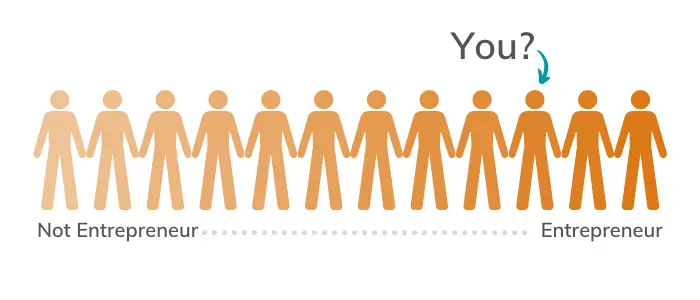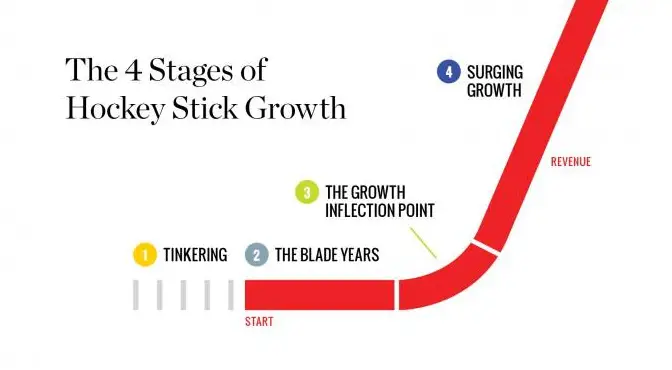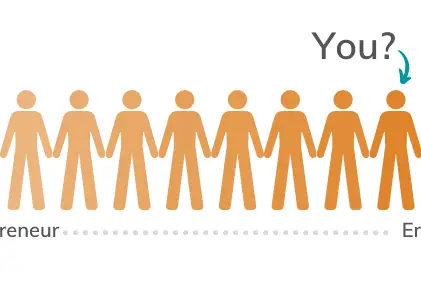I’ve lost count of the number of times I’ve heard “I wish I had a business to be my own boss.” Entrepreneurship is painted as the ultimate in today’s media, and I’m inclined to agree. But it’s no bed of roses. Entrepreneurship is not for everyone, but let me show you why it’s a choice anyone can make.
Page Contents
- Is entrepreneurship for everyone?
- Entrepreneurs are made (and my bias)
- 10 Tips to make the switch to entrepreneurship
- Tip 1: Stop caring about your credentials
- Tip 2: Accept how friends and family won’t care
- Tip 3: Understand that entrepreneurship is a spectrum
- Tip 4: Welcome being uncomfortable
- Tip 5: Have intentionality with your time
- Tip 6: Be bent on leading a team
- Tip 7: Face adversity with poise
- Tip 8: Brush up on business 101
- Tip 9: Know you’re in for the long haul
- Tip 10: Realize that it’s not about YOU
- Conclusion
Is entrepreneurship for everyone?
The short answer is “no, entrepreneurship isn’t for everyone.” Not everyone will understand risks, much less be comfortable with risks. Everyone will also have their own priorities. Some priorities lead to entrepreneurship (e.g., valuing time over everything, or the larger income potential), while other priorities lead to employment (e.g., the prestige of belonging to a well-known corporation, or the safety of a job).
There’s also no right nor wrong path. I’d say entrepreneurship is my preferred path (be modern-day kings, not slaves), but I do understand how others find comfort in the stability and security of a job because I was in the same boat.
Entrepreneurs are made (and my bias)
There are interesting studies on whether entrepreneurs are born or made. You certainly could argue how entrepreneurs are born and I wouldn’t be mad. But from what I’ve seen, I’d lean more towards the “entrepreneurs are made” school of thought.
A lesson in logic and proof
One rule in logic is it takes only one counterexample to disprove a statement. For example, if we say “that is a basket of only red apples,” then it takes just one green apple to disprove the statement. Or if we say the stock market always goes up, it just takes one down day to disprove the statement.

I wasn’t born an entrepreneur. My cautious self was too intolerant of risks (as a 10-year old I had an attache case to store my money) and I was on a mission to prove my worth in a corporate setting. In fact, I’d say entrepreneurship was forced on me. But I’m now at a point where I’d never choose employment over entrepreneurship.
So, if I wasn’t born an entrepreneur, then maybe that disproves how entrepreneurs are born?
Granted, that’s an oversimplification and you could say I was born with strong determination (arguable). Or that both nature and nurture are factors, with one a more dominating factor. In any case, my experiences are key reasons for my bias.
(Now that you know my bias, I hope you take what’s written here for what it is and decide on your own with your unique biases.)
Change is a choice
Even though circumstances are uncontrollable and what’s in store is unknown, we still choose how we respond.
I’ve been blessed with loving parents. They introduced the idea of entrepreneurship to me by handing over one of their ventures after I quit my job in finance. But even then, I was on the lookout for other job opportunities. I ultimately got another job. And got fired.
The time in-between my last two jobs got me thinking, and when I lost my job I had a shift in mindset that I attribute to these books.
- The Millionaire Fastlane: Crack the Code to Wealth and Live Rich for a Lifetime by MJ DeMarco (My takeaway: Never work for a company again) – Buy this book on Amazon
- Zero to One: Notes on Startups, or How to Build the Future by Peter Thiel (My takeaway: Question everything; Strive for a monopoly) – Buy this book on Amazon
- The 10X Rule: The Only Difference Between Success and Failure by Grant Cardone (My takeaway: A refreshed view on control; No excuses for the choices you make) – Buy this book on Amazon
It’s not about these specific books either. I don’t know about you, but book titles with “millionaire” make me cringe. I’m also not a fan of Cardone’s aggressive marketing tactics. Having said that, I can’t argue with their impact on me.
When it comes to books at least, context is more important than content.
These were simply the right books at the right time. I didn’t have control over my family nor my boss, but I did have control over the actions I took. And these books nudged me to where I’m at.
You can have a similar mindset shift by reading books. If you’re looking to make the switch to entrepreneurship, here’s a list of what I think helps.
10 Tips to make the switch to entrepreneurship
I’ve now been an entrepreneur with businesses in various industries for half of my adult life. That’s half at managerial roles in corporate finance, and half as a business owner. There have been a few major lessons in my transition that I hope to share with you. These develop the characteristics of a successful entrepreneur.
(Related: If you understand Tagalog, I made a list of what I think are the characteristics of successful entrepreneurs: 11 Katangian ng Isang Entrepreneur)
Tip 1: Stop caring about your credentials
The reality is, credentials like MBAs and PhDs don’t matter as business owners. You’re kidding yourself if you think the added formal classes make you a better entrepreneur. If you take away the networking opportunities of school, there’s really little value to them in today’s age. Every little bit of information is available online.
Yes, there’s an unsurprising strong correlation between education and income. But curiously, there are also diminishing returns when you add more education. Your time is better spent growing the business.
When you’re an entrepreneur, titles, prefixes, and suffixes matter far less.

Are you a professional who believes the prestige of world-class universities will bring you more clients? You’re probably right, but I don’t think that’s true causation. Relationships matter far more. Besides, a true entrepreneur will simply hire the necessary credentials at best.
Tip 2: Accept how friends and family won’t care
It’s common for new business owners to get excited about their new venture and expect everyone else to care for it like their baby. But the sad reality is no one cares about your business more than you, and most will only support it if it benefits them.
I’m sorry but Facebook likes from friends do nothing but stroke your ego. We learned this the hard way. I mean, sharing is fine to start that snowball, but make sure a bulk of your effort is targeting people outside your network. Because even if you do get the ball rolling, a business that depends on your circle isn’t going to be around for long.
When you accept this truth, unsupportive friends become less of a worry and you put your energy into actually running the business.
Maybe this is unique to the family-centric culture of the Philippines, or maybe it’s what everyone goes through. In any case, you shouldn’t expect people to support your business if it isn’t in their best interests.
Tip 3: Understand that entrepreneurship is a spectrum
Entrepreneurship, and the line between entrepreneurs and non-entrepreneurs, is not as clear as black and white. Some are more entrepreneurial than others, and that’s okay.

Thomas Edison is quoted to have said “I have not failed. I’ve just found 10,000 ways that won’t work.” Now, I wouldn’t say I’m that determined. But that doesn’t mean I can’t be an entrepreneur.
There’s a spectrum of entrepreneurs and there are levels to our entrepreneurial spirit.
Just because you’re less entrepreneurial than someone else doesn’t mean you’re not an entrepreneur.
The same applies to risk tolerance. Entrepreneurs understand and accept risks. But that doesn’t mean you’re always reckless with the risks you take. It’s a spectrum that’s saying you’re willing to bear at least some level of risk.
(If you’re the type who absolutely cannot stomach the thought of risks, of losing some money, then entrepreneurship is not for you.)
Tip 4: Welcome being uncomfortable
Everyone has preferences. For example, I’d rather stay in front of a computer than talk to people. But I also understand how business is about who we know more than what we know. That’s why I push myself to network outside of my comfort zone. I still prefer solitude, but networking is now something that isn’t as uncomfortable.
Most things become easier over time and the first step is always the hardest.
Or if you absolutely hate math, there’s no getting around understanding the fundamentals of finance. It’s the language of business and you should at least get the basics.
(Related: Finance for People Who Hate Math)
Tip 5: Have intentionality with your time
As an entrepreneur, you’ll have responsibility for the company’s accounting, marketing, and everything in between. There’s no boss telling you what to do, and that can be good and bad.
The temptation is to work as hard as you can, squeezing as much work as possible, for the business to succeed. But I urge you to resist this impulse and do these instead:
(1) Have a big picture view of your business and know what actions need to be done.
(2) Determine which ones to pass on or outsource.
(3) Focus on one activity at a time. Batch your work in time blocks.

(Related: Up your outsourcing game with Fiverr.)
I saw the biggest transformation when I started journaling. Writing on a journal does sound cheesy, and I must say I wasn’t a fan of the idea. But it works. I’m not sure what it is about writing. It’s probably the inherent calmness (slowness) of writing. I found I’m able to decide if an activity is worth doing or not. Or if it’s a priority or not.
Regardless of your system, be intentional (but flexible) with your schedule. Start the year/month/week/day knowing which activities give you the best returns and act on those. Or what Gary Keller calls your “One Thing,” the one activity that has the most impact. (Get the audiobook on Amazon.)
Tip 6: Be bent on leading a team
The most successful entrepreneurs aren’t necessarily the smartest, most creative, or the ones who work the hardest. Instead, they are the people who understand their weaknesses and hire or partner based on that.
You’re likely going to wear multiple hats at the onset, but as the business expands, looking for help is your best bet.
(Related: My takeaways of the book The E-Myth Revisited: Why Most Small Businesses Don’t Work and What to Do)
Tip 7: Face adversity with poise
If you’re running an actual business that goes beyond your inner circle, then irate customers or directed attacks from competitors or regulatory bodies are bound to happen.
Rather than pointless sulking, talk about the hard things with your team. It’s easy to celebrate the wins. But if you want to survive, it’s crucial you talk about the problems with honesty and respect.
(Related: The Hard Things About Hard Things: Building a Business When There Are No Easy Answers by Ben Horowitz. Buy on Amazon)
And boy, is it hard! It’s made me cry more than anything I’ve ever done in my life, that I can say.
Tip 8: Brush up on business 101
Aim for monopolistic shares. Without going into the legalities of monopolies, a business that gains more market share, one that’s closer to a monopoly, will profit more.
Think about how you can gain market share by providing value that’s preferred by customers. Or better yet, think about how you can create a new market and be the lone player. In fact, that is what Blue Ocean Strategy, a strategy studied by Harvard Professors Chan Kim and Renee Mauborgne, is about.
Learn which projects give the best returns. You will have limited resources (money and/or time) so it’s best to optimize your selection of projects. Which activities you pursue and reject, particularly in the beginning, will have a snowball effect. That said, don’t fret choosing incorrectly. Action is still better than perfection. (Because ‘perfect’ does not exist.)
(Related: #businesseconomics)
Understand how consumers make choices. Let people know of your product or service with marketing. My recommended books are Made to Stick: Why Some Ideas Survive and Others Die and Contagious: Why Things Catch On. (These are links to Amazon.)
Track your cash with the right accounting software for small businesses.
Tip 9: Know you’re in for the long haul
There is a huge time investment when starting a business. In some industries, you might expect to operate for years without profit. In all cases, there will be upfront costs that’ll take time to recover.
When you know you’re in for the long haul, restlessness is lessened. You understand it takes time for that hockey stick growth to kick in, and that’s a sacrifice you’re willing to make.

Tip 10: Realize that it’s not about YOU
In the end, entrepreneurship isn’t about you. It’s about serving the most people with the biggest possible impact. The more value you bring, the more you earn in profits.
You can sell to a lot of people at small margins, sell to fewer people at large margins, or sell to a lot of people at high margins.

Conclusion
Is entrepreneurship for everyone? Hardly. But if you do decide to pursue being an entrepreneur, the good news is it’s possible for just about anyone with the right mindset. And the right mindset is an acquired skill.
To me, true financial freedom while having a job is a paradox. Although it may mean high income, having a job means inflexibility and that’s not what freedom is about. Not to mention the higher income potential of businesses. But that is my personal bias and it’s not to take away from the advantages of having a job.
So while entrepreneurship is not for everyone, that’s not really a bad thing.
*This post may contain affiliate links. You can read my affiliate disclosure here, Terms & Conditions, #6 Links.
Read more, select a topic:








